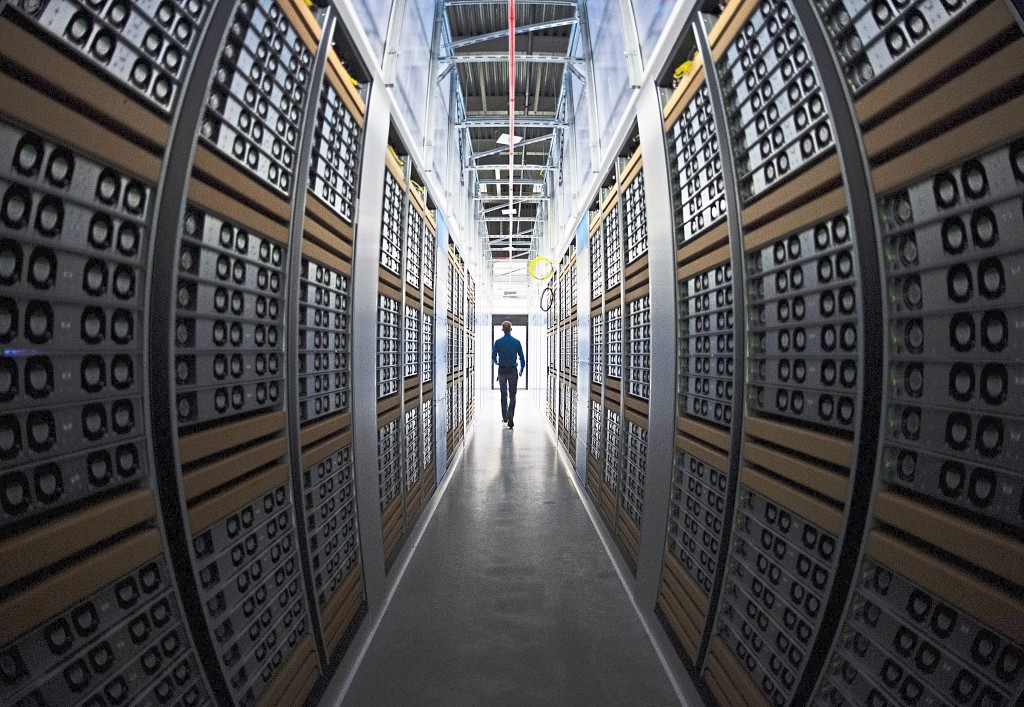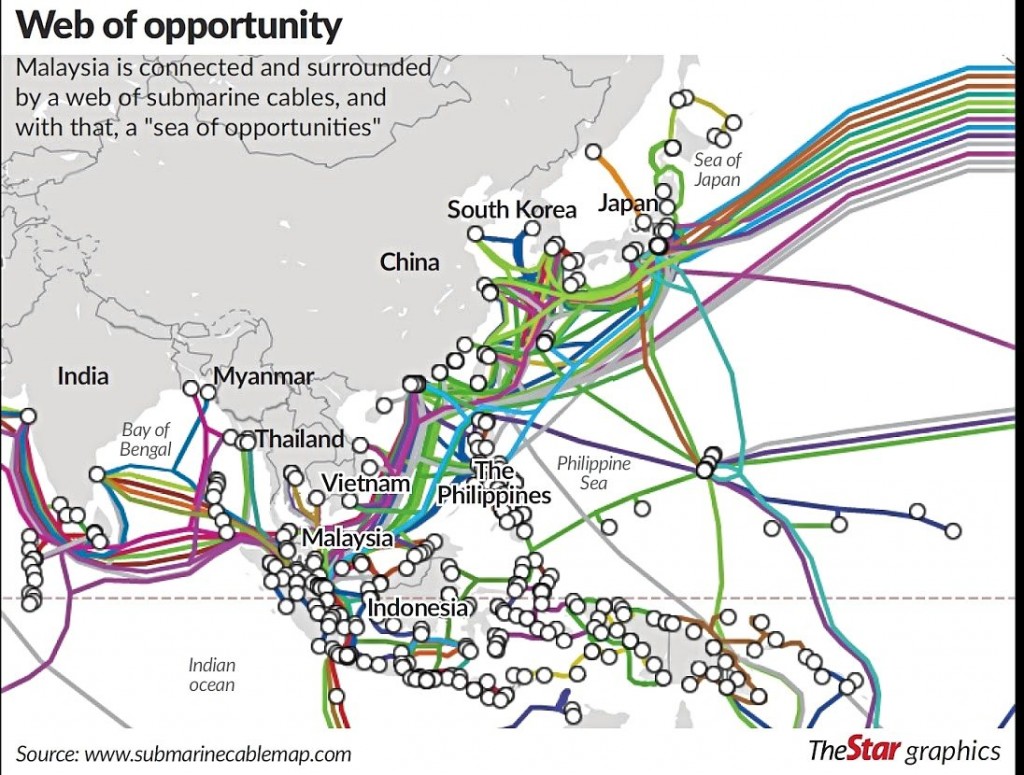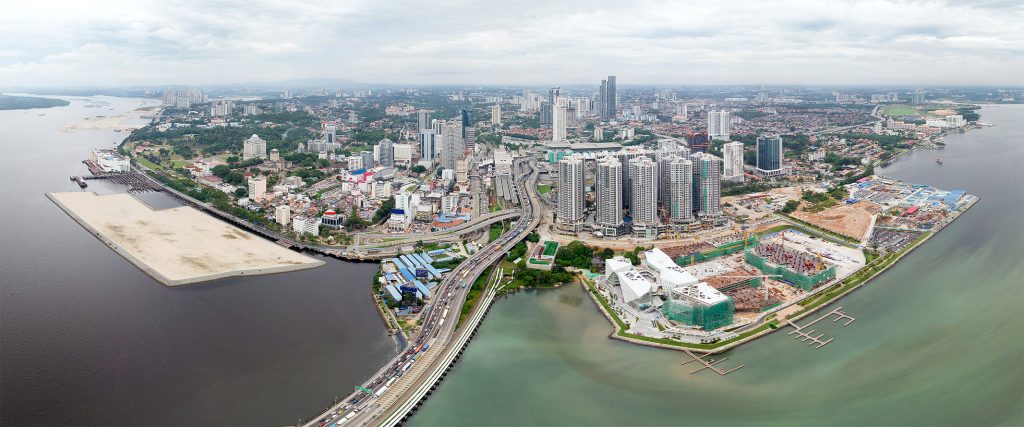Real estate industry sees strong outlook for this growing facility
Over the last five years, Malaysia has experienced significant growth in the establishment and expansion of data centres. This surge can be attributed to various factors, including increasing digitalisation, expanding internet penetration and the growing demand for cloud computing and data storage services.
In fact, Malaysia has emerged as an essential player in the global data centre market, attracting billions of dollars of investment from global tech companies, according to Kashif Ansari, co-founder and group chief executive officer of Juwai IQI, Asia's largest real estate technology company.
One key driver of the growth of data centres in Malaysia is the country's strategic location and favourable business environment. Situated in the heart of Southeast Asia, Malaysia serves as a regional hub for businesses looking to expand their operations in the Asia-Pacific region.
Its robust telecommunications infrastructure, reliable power supply and political stability make it an attractive destination for data centre investments.
The Malaysian government has also been proactive in promoting the development of data centres through various initiatives and incentives. For instance, the Malaysia Digital Economy Corporation (MDEC) has implemented programs to attract foreign investments in the digital sector, including data centres.
These initiatives aim to position Malaysia as a leading data centre hub in the region and encourage the establishment of high-quality, state-of-the-art facilities.
There are currently 33 data centres in Malaysia, with at least a dozen more in the development pipeline. Cyberjaya, Kuala Lumpur and Selangor are by far the top locations for data centres, followed by Johor.
"Malaysia has emerged as a top Asia Pacific region (APAC) data centre market because of supportive government policy, high levels of connectivity, a large population, abundant cost competitive land, inexpensive sustainable energy, and its geographical position at the heart of Asean and next-door to Singapore,” said Ansari.
The rapid growth of e-commerce, digital services, and social media platforms has contributed to the increasing demand for data centres in Malaysia. As businesses and individuals generate and store vast amounts of data, there is a need for secure and reliable infrastructure to handle the processing, storage, and management of this information. Data centres play a crucial role in ensuring the availability, scalability, and security of digital services and applications.
Another significant factor driving the growth of data centres in Malaysia is the increasing adoption of cloud computing. As businesses embrace cloud-based solutions to streamline their operations and enhance flexibility, the demand for cloud services and hosting facilities has risen. Data centres provide the necessary infrastructure and connectivity for businesses to leverage cloud computing platforms, enabling them to scale their operations and access advanced technologies.
A main contributor to the speed of this new demand was the outbreak of the Covid-19 pandemic in early 2020, which further accelerated the growth of data centres in Malaysia. With the shift towards remote work, online education, and digital services, there has been an exponential increase in data traffic and storage requirements. Data centres have played a vital role in supporting the digital infrastructure needed to sustain these activities and ensure seamless connectivity.
"The pandemic has made broadband connectivity and cloud-based productivity tools more important than ever in the daily lives of Malaysians. And the reshuffling of supply chains during reduced business travel has made cloud-based tools and services a more critical element of economic growth than before the pandemic. These two factors underlie the growing demand for data centres, which make cloud-based services possible,” said Ansari.
Excellent connectivity
"Malaysia has excellent connectivity to the rest of Asia and the world through 29 submarine cable networks with 14 landing stations. Three additional submarine cables may come online in the next few years.
"Our population is young, digitally savvy and upwardly mobile. Only about 8% are of retirement age, while 23% are aged 14 and younger. Meanwhile, 89% of Malaysians are smartphone and internet users. That is one of the highest rates in Southeast Asia. This youthful and digital population drives the country's booming e-commerce market. Most analysts expect the e-commerce market to grow at a 13.6% compound annual growth rate through 2027. By 2027, e-commerce could be worth US$17 billion to Malaysia.
"Malaysia is on the fast track towards further digitalization. For example, the Jendela initiative will lead to the investment of RM21 billion in fast broadband services. It will also ensure that just about every Malaysian can at least access 4G broadband service.
"The business community is also fast embracing the benefits of digitalisation. Three-quarters of Malaysian companies have already adopted some type of cloud service.
"Malaysia's strong push towards deploying 5G benefits the data centre market and is already increasing demand. The announcement that Malaysia may launch a second 5G network will likely increase uptake.
Land and energy costs favour Malaysia
"You can't build a data centre without a parcel of land, so it is more difficult to build data centres in markets with high land costs. Malaysia has a significant advantage over other markets when it comes to land costs. Malaysia's Johor and Kuala Lumpur have the lowest land costs of top data markets in the APAC. Land in Johor and Kuala Lumpur can be acquired for data centres at about one-quarter the cost of comparable land in the world's number 1 data centre market, which is Northern Virginia, in the USA. Malaysia has approximately 600 industrial estates with robust connectivity that might make them appealing as sites for data centres.
"Another significant cost in data centre operations is energy. Operators are very sensitive to their contribution to climate change and don't want dirty energy. Data centres are tremendous consumers of energy. They consumed 190.8 terawatt-hours of energy usage worldwide in 2021. They also contribute approximately 1% of energy-related greenhouse gas emissions every year.
"Data centre operators are under constant pressure to reduce their energy usage costs and environmental impact. Malaysia has an advantage in both energy and land. Malaysia is attractive because green energy will account for approximately 40% of all power generation by 2035. Also, in other key data centre markets across the globe, utility costs are expected to rise by a median of 16% in the years ahead.
"Malaysia's strategic location at a chokepoint along the routes of submarine cables and next door to Singapore is also an advantage. Singapore is one of APAC's largest consumers of data and the world's third-ranked data centre market. The challenge for Singapore is a scarcity of both land and affordable green energy.
"Singapore only recently removed a moratorium on new data centre construction but has retained some strict rules on what can be built. Therefore, Singapore's data centre vacancy rate is just 2%, a worldwide low for major markets. This gives Malaysia an opportunity.
To cut the chase, Malaysia has experienced significant growth in the establishment and expansion of data centres. The country's strategic location, favourable business environment, government support, and increasing digitalization have contributed to this growth. As the demand for digital services and data storage continues to rise, the data centre industry in Malaysia is expected to expand further, driving innovation, economic growth, and technological advancement.
Billions in economic value
A thriving data centre market in Malaysia, directly and indirectly, impacts economic growth. It leads to the direct investment of billions of ringgit and the creation of tens of thousands of new jobs.
Indirectly, data centres enable the digital transformation of the economy. Researchers believe the transformation could deliver up to RM257.2bil in annual economic value by 2030.
"The data centre market is expected to grow at a compound annual growth rate of 9.4% to 12% in 2028, depending on the forecast. The market will attract new inbound investments worth US$2 billion to US$3.1 billion by 2028.
"Behind this growth are some of the biggest companies in the world. Google Cloud, Microsoft Azure, and Amazon Web Services are all establishing bigger and better infrastructure in the country,” said Juwai IQI co-founder and group chief executive officer Kashif Ansari.
Amazon Web Services is a great case study because they are investing US$6 billion in Malaysia over the next 14 years to create data centres that will prevent potential disruptions and provide low latency to local businesses.
Other players continue to pile into the sector. Just a few weeks ago, Australian data centre operator NEXTDC said it would accelerate its expansion plans in Malaysia and is raising US$419.2 million in part to do so.
"An example of what growth in the data centre market will look like in the years to come can be found at the YTL Green Data Centre Park in Johor. Singaporean Internet technology firm Sea will be the anchor tenant for this RM1.5 billion project providing green energy and advanced facilities.
Johor Menteri Besar Datuk Onn Hafiz Ghazi said the 111-hectare, 500-megawatt (MW) green data centre park is currently the largest data centre park in Malaysia and it is also the first one to be powered by renewable energy.
He noted that many data centre providers are choosing to set up their data centre facilities outside of the more advanced markets, adding that Johor has the potential to become a prominent global data centre market.
"We have grown into a robust technology hub and a desired location for digital investments. Our status as the current regional hub for manufacturing, logistics and big data analytics is definitely a plus point," he said.
This example shows that the data centre boom is bringing the most advanced construction techniques, sustainable practices, and innovative technology to Malaysia. “Data centres mean more than billions of dollars of growth. They also mean high-quality jobs and a green economy," said Ansari.

The data centre market is expected to grow at a compound annual growth rate of 9.4% to 12% in 2028, said Ansari.
Stay ahead of the crowd and enjoy fresh insights on real estate, property development, and lifestyle trends when you subscribe to our newsletter and follow us on social media.
















































